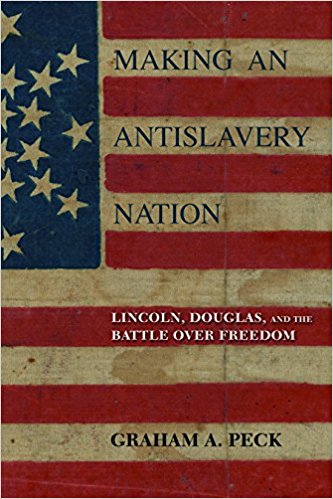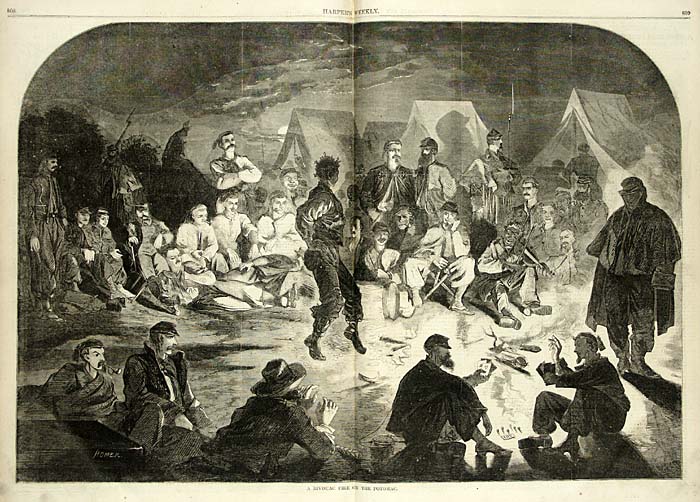Making an Antislavery Nation: Lincoln, Douglas, and the Battle Over Freedom by Graham A. Peck. University of Illinois Press, 2017. Hardcover, ISBN: 978-0252041365. $34.95.
 Graham Peck’s first book tackles big issues and delves into contested terrain. Even if Making an Antislavery Nation ultimately fails to persuade this reviewer, its spirited tone and bracing prose command notice. Peck contends that Abraham Lincoln pretended to favor a “conservative antislavery extension policy” and thereby obscured his core motivation—a “radical opposition to slavery” (176, 179). His Illinois rival, Stephen A. Douglas, posed as a champion of free white Northern farmers but actually gave “unwavering support” to the proslavery South (186). Appearances, it would appear, were deceiving. How should Peck’s bold iconoclasm be assessed?
Graham Peck’s first book tackles big issues and delves into contested terrain. Even if Making an Antislavery Nation ultimately fails to persuade this reviewer, its spirited tone and bracing prose command notice. Peck contends that Abraham Lincoln pretended to favor a “conservative antislavery extension policy” and thereby obscured his core motivation—a “radical opposition to slavery” (176, 179). His Illinois rival, Stephen A. Douglas, posed as a champion of free white Northern farmers but actually gave “unwavering support” to the proslavery South (186). Appearances, it would appear, were deceiving. How should Peck’s bold iconoclasm be assessed?
Their famed 1858 debates in Illinois pitted Douglas, the embattled Democratic incumbent, against Lincoln, the astute challenger who built the state’s newly formed Republican Party into near parity with the previously dominant Democrats. At stake was the seat in the U.S. Senate Douglas had held for two terms. Peck in effect echoes what the two candidates said about each other. Douglas repeatedly denounced Lincoln as a “Black Republican” who fraternized with “Father [Joshua] Giddings, the high priest of abolitionism,” Congressman Owen Lovejoy, and “Fred Douglass, the negro.” Lincoln countered that Douglas had conspired to “make Slavery alike lawful in all the States—old as well as new, North as well as South.” Continued cut-and-thrust during their seven encounters sharpened these harshly worded accusations.[1]
In other ways, however, the debates blurred the differences separating the candidates. Douglas indignantly denied that he plotted to expand the slave system into the free states. Consequently, historians often have given Lincoln’s alarms low marks. Albert Beveridge, writing in the 1920s, saw no threat that slavery might have become national and commended Douglas as a responsible moderate. A generation later, Richard Hofstadter found Lincoln a clever pugilist whose scare tactics were “probably without factual foundation.” Allan Nevins groused that Lincoln concocted an “absurd bogey.” Eric Foner and Richard Sewell, even though writing amid a far more antislavery climate of opinion, concluded that Lincoln’s claims “strained credibility” and were “unquestionably overdrawn.”[2] But other historians lean Lincoln’s way. Don Fehrenbacher found the frightening potentiality Lincoln warned about “far from absurd.” David Potter likewise noted that the Supreme Court had at hand the ingredients for “a decision to legalize slavery nationally,” even though “it seems incredible that nine sane justices could have contemplated such a decision.”[3]
Lincoln rejected the abolitionist label Douglas tried to pin on him. He would prevent slavery’s expansion into new territories, but he acknowledged that slavery’s opponents had no leverage to change the status quo in the states where it already existed. Emancipation only would come, he prognosticated, in the distant future when white Southerners overcame their addiction to forced labor. And Lincoln opposed “bringing about in any way the social and political equality of the white and black races.”[4] These words, even if uncongenial to modern ears, made political sense; he needed support from conservative former Whigs who voted for third-party presidential candidate Millard Fillmore in 1856. Lincoln also made rhetorical appeals to the state’s antislavery vanguard but dared not embrace them closely. He disavowed their key proposals—abolition in the District of Columbia, no new slave states, repeal of the Fugitive Slave Act, and ending the interstate slave trade. The evidence suggests that Lincoln was neither an abolitionist nor a conspicuous path-breaker in the political antislavery movement. One of his closest advisers was David Davis, a pronounced anti-abolitionist.
Peck, convinced that Lincoln and Douglas accurately understood each other, suspects they each obfuscated their own beliefs. One of his book’s most arresting segments focuses on Lincoln’s New York City debut, the famed Cooper Union speech in February 1860. Conventional wisdom has it that Lincoln positioned himself as a moderate mainstream Republican for an audience eager to wrest the upcoming presidential nomination away from the front-runner, William H. Seward. Peck instead finds a “masterful” manipulator at work, one whose “tone resonated with reasonableness” even as he distorted the historical record and pretended to be someone he wasn’t. Lincoln’s “ingeniously misleading arguments” cloaked his radical antislavery commitment with an “eminently conservative” veneer (176-78).
Douglas often said a Pacific railroad would open the West for settlement. Was that his reason for wanting Nebraska organized as a territory in 1853-54? Peck thinks Douglas had additional motives. When Southern Democrats demanded full repeal of the Missouri Compromise, which had barred slavery in Nebraska, Douglas happily obliged “because it converged with his core beliefs” (115). Convinced incorrectly that “antislavery ideology had shallow roots in the northern public mind,” he hoped Nebraska legislation would purge the Democratic Party of its troublesome antislavery malcontents (119). But in 1858, Douglas repudiated President James Buchanan and joined with Senate Republicans to defeat the Lecompton Constitution, a Southern-engineered ruse to make Kansas a slave state. Peck downplays Lecompton and emphasizes Douglas’ continued outreach to the South; the Illinois Senator proclaimed that, “national expansion and slavery’s growth went hand in hand” (146). Why then, one may ask, did the powerful nucleus of Southern Democrats who dominated the Senate turn against Douglas with such fury that that they ultimately destroyed their party and with it their power in the Union?
Making an Antislavery Nation should be read in tandem with David Potter’s Impending Crisis. Potter wrote that Lincoln and Douglas agreed superficially about policy but disagreed about substance. Each expected to stop slavery from expanding—Lincoln by overtly legislating against it; Douglas by allowing popular majorities to withhold pro-slavery regulations at the territorial level. And both opposed Lecompton. So Lincoln turned from policy convergences to philosophical differences, which he considered “conspicuous and fundamental.” The Founding Fathers had moral objections to slavery, Lincoln thought; they tried to restrict its spread and hoped it would disappear. Douglas countered that the founders shared his view of “popular sovereignty,” through which slavery policies were determined at the local level, and he incessantly stated that he didn’t care whether slavery was voted up or voted down. Lincoln insisted a “don’t care” policy was dangerous. If people didn’t care to stop slavery, it would spread. In practice, “don’t care” was a moral anesthetic with pro-slavery consequences. And Lincoln twisted the knife: Douglas’ “declared indifference” masked a “covert real zeal” to spread slavery.[5] Potter thought Lincoln was torn between “conflicting values”: his stances on the hot-button issues of the 1850s clashed with his abstract commitment to the explosive principle of equal rights. He was unable to reconcile “subordination with equality.” Lincoln’s ideas, Potter concluded, were “ambiguous” but “vastly different” from his rival’s: “By a static analysis, Lincoln was a mild opponent of slavery and a moderate defender of racial discrimination. By a dynamic analysis, he held a concept of humanity which impelled him inexorably in the direction of freedom and equality.”[6]
Peck and Potter agree that Lincoln’s core values were more egalitarian than he dared to articulate in public. Peck finds Lincoln consciously deceptive, knowing himself to be more antislavery than the Founding Fathers and knowing they did little to stop slavery; Potter takes Lincoln’s veneration of the founders at face value. If Peck is correct, Lincoln may have cut other corners. For example, might he deliberately have exaggerated the danger that slavery soon could be made legal in the North, just as in the South? Both ideas—claiming the mantle of the founders and seeing a threat that slavery might become national—were, as Eric Foner and Richard Sewell have shown, central tenets of antislavery politics.[7] Lincoln eagerly championed both because he could not endorse more specific parts of the antislavery agenda, such as forbidding the admission of new slave states.
Peck takes issue with Michael Holt, William Gienapp, and Edward Ayers, who depict the North-South sectional conflict and the rise of antislavery politics in “contingent” rather than “structural” terms (9, 121, 207n12, 208n16). Northern moral opposition to slavery, Peck contends, had deep roots that extended back for generations. Such sentiments remained latent until the mid-nineteenth century because many in the North hoped slavery eventually would disappear and hesitated to disrupt the Union. But the sleeping giant of Northern antislavery began to awaken once the South demanded more territory for slavery. The more the South dictated policy to the Democratic Party, the more it weakened that party in the free states. The Kansas-Nebraska Act breathed life into a new Northern political grouping, the Republican Party, poised to challenge Democrats and circumscribe the South’s power and domain. “Antislavery nationalism” firmed up the moderate center of Northern public opinion as the white South became ever more intransigent. A collision was sure to happen, Peck writes, because Lincoln demanded a new “northern definition of freedom” just as Douglas caved in to Southern extremists and embraced “proslavery politics” (9-10, 193). “Contingent” historians suggest that only the unexpected outbreak of war set in motion forces sufficient to produce emancipation; Peck says “broad historical forces” doomed the slave system long before April 1861 (121).
Peck has dug deep in Illinois sources and offers excellent maps to chart the political evolution of that all-important state. In saying the Republican Party embraced a radical antislavery nationalism, he presents a systematic argument for a point of view shared with his mentor, James Oakes. But it requires special pleading to explain why “conservative Northerners” who ruled out an “abominable abolitionist crusade” in the 1830s and 1840s reversed themselves two decades later to confront the white South with an ultimatum (11, 182). Peck conflates carefully calibrated political posturing with a conscious plan to force an apocalyptic showdown. He transforms Lincoln from a shrewd politician into an incipient revolutionary, the one uniquely prescient actor on the stage. Peck’s claim that antislavery nationalism “provided a bridge” to make “the principle of human equality” salient for a majority of the Northern electorate in 1860 is a bridge too far (88, 192).
Daniel W. Crofts is the author of Lincoln and the Politics of Slavery: The Other Thirteenth Amendment and the Struggle to Save the Union (2016).
[1]Roy P. Basler, ed., The Collected Works of Abraham Lincoln, 9 vols. (New Brunswick: Rutgers University Press, 1953-55), III:18, 105-7.
[2]John Braeman, “Albert J. Beveridge and Demythologizing Lincoln,” Journal of the Abraham Lincoln Association, 25:2 (Summer 2004), 1-24; Richard Hofstadter, The American Political Tradition: And the Men Who Made It (New York: Alfred A. Knopf, 1948), 150-51; Allan Nevins, The Emergence of Lincoln, 2 vols. (New York: Charles Scribner’s Sons, 1950), I:361-63; Eric Foner, This Fiery Trial: Abraham Lincoln and American Slavery (New York: W. W. Norton, 2011), 101; Richard H. Sewell, Ballots for Freedom: Antislavery Politics in the United States, 1837-1860 (New York: W. W. Norton, 1976), 302.
[3]Don E. Fehrenbacher, Prelude to Greatness: Lincoln in the 1850’s (Stanford: Stanford University Press, 1962), 81; David M. Potter, The Impending Crisis, 1848–1861, completed and edited by Don E. Fehrenbacher (New York: Harper and Row, 1976), 350-51.
[4]Basler, ed., Collected Works of Lincoln, III:145.
[5]Basler, ed., Collected Works of Lincoln, II:255.
[6]Potter, The Impending Crisis, 338, 344, 354.
[7]Eric Foner, Free Soil, Free Labor, Free Men: The Ideology of the Republican Party Before the Civil War (New York: Oxford University Press, 1970), 73-77, 83-87; Foner, The Fiery Trial, 101-2; Sewell, Ballots for Freedom, 258-59, 299-304.
